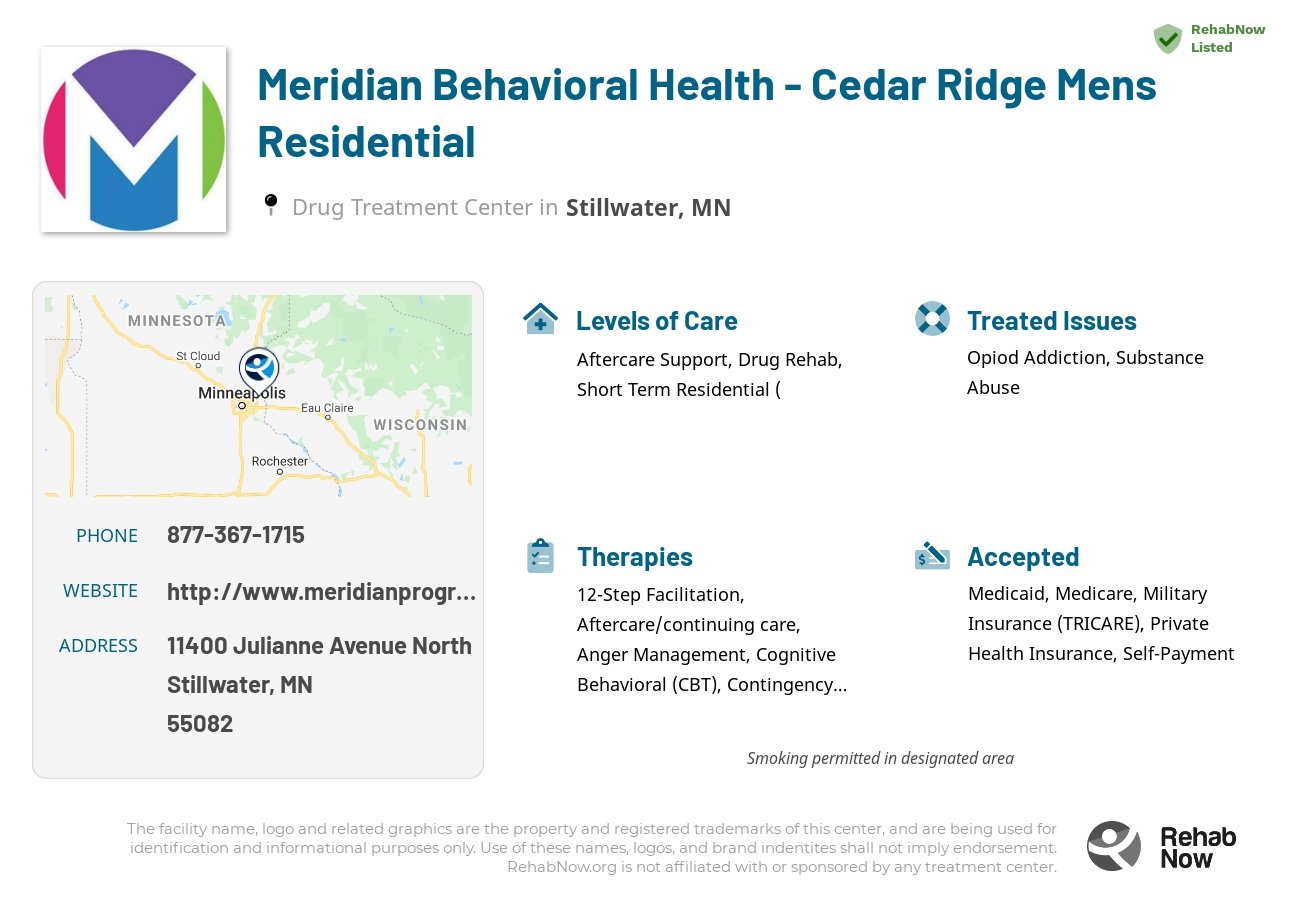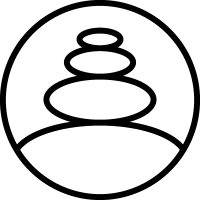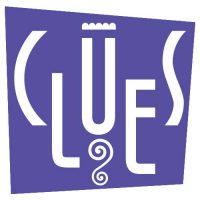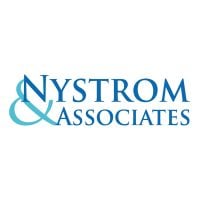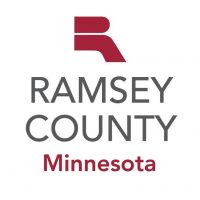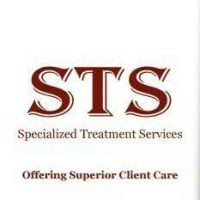Meridian Behavioral Health - Cedar Ridge Men's Residential
Drug Rehab Center in Stillwater, Minnesota
Cedar Ridge Men's Residential offers a comprehensive dual-diagnosis drug treatment program for individuals suffering from opiate addiction, alcoholism, drug addiction or mental health disorders, which includes detoxification and aftercare services, as well as inpatient, residential and day treatment levels of care accredited by organizations like JCAHO (Joint Commission on Accreditation of Healthcare Organizations).
About Meridian Behavioral Health - Cedar Ridge Men's Residential in Minnesota
Located in Stillwater, MN, Meridian Behavioral Health - Cedar Ridge Men's Residential is a traditional rehab facility with a primary focus on men’s recovery from addiction. It distinguishes itself through a supportive environment tailored specifically for men, addressing a wide range of substance abuse and mental health issues.
Meridian Behavioral Health - Cedar Ridge Men's Residential is recognized for its commitment to quality care, holding accreditations from JCAHO, NAATP, and CARF, and possessing a State License. These accreditations affirm the facility's dedication to providing the highest standards of treatment for alcoholism, dual diagnosis, opioid addiction, drug addiction, and mental health challenges.
- Offers specialized care for men, creating a focused and understanding environment for recovery.
- Holds prestigious certifications from JCAHO, NAATP, CARF, enhancing trust in their quality of care.
- Provides a comprehensive range of services, including aftercare support and detox, tailored to men’s unique recovery needs.
Meridian Behavioral Health - Cedar Ridge Men's Residential treats alcoholism, opioid addiction, drug addiction, and co-occurring mental health issues. The facility employs a variety of treatment methods, including detox, drug rehab, and dual-diagnosis treatment, offering both inpatient and residential levels of care to support men on their journey to sobriety.
Genders
Ages
Modality
Additional
Accreditations
State License
NAATP

JCAHO

CARF
The Commission on Accreditation of Rehabilitation Facilities (CARF) is a non-profit organization that specifically accredits rehab organizations. Founded in 1966, CARF's, mission is to help service providers like rehab facilities maintain high standards of care.
Conditions and Issues Treated
Substance abuse is the excessive use of any drug. This includes alcohol, medications, and illegal drugs. Substance abuse is treated with a combination of physical and mental treatments. Patients detox and follow up with therapies that target the underlying cause of the addiction. Substance abuse is a severe problem that can be successfully treated with a variety of therapies. Meridian Behavioral Health - Cedar Ridge Men's Residential treatment uses a combination of therapies along with other resources to overcome substance abuse.
Opioid addiction treatment should be done in a medically supervised drug rehab. While taking opioids, users will typically use other substances to enhance the effects of opioids or to reduce the adverse effects of opioid use. Opioid addiction treatment will include detoxification and drug rehab counseling to help both the user and their loved ones learn how to live a successful sober lifestyle.
Treatments such as methadone, buprenorphine, and naltrexone are three medications that can help treat opioid addiction. These drugs work on the brain’s pleasure center and reduce cravings and the effects of illicit opioids such as heroin. These drugs can be either given orally or by injection. Individual drug rehab counseling sessions can be helpful to discuss any questions or concerns with the drug treatment program. This counseling will also help the user set goals for when they finish drug rehab.
Opioid addiction recovery is a long process. Many of the changes to the brain caused by opioid use cannot be undone, but with time and the proper treatment, a person can return to normal function. After detox, treatment will include drug rehab counseling and entering a halfway house or sober living community. Aftercare is critical to long-term recovery, as it helps the user avoid relapsing and entering back into drug rehab.
Levels of Care Offered
This center offers a variety of custom treatment tailored to individual recovery. Currently available are Aftercare Support, Detox, Drug Rehab, Dual-Diagnosis, Inpatient, Residential, with additional therapies available as listed below.
An addict may have to go through alcohol or drug withdrawal. While detox may be uncomfortable, it is not life-threatening. Detoxification allows the addict to rid the body of all traces of drugs or alcohol and gives the addict a clean slate for their recovery. In an inpatient or outpatient setting, detox can be managed medically.
Inpatient treatment for alcoholism or drug addiction is an option that provides the addict with a supportive environment in which they can stop using. This type of treatment is appropriate for addicts that are most in need of intensive care and supervision. This includes those who were unable to quit on their own, those who need more structure than they can get in outpatient treatment.
Residential treatment programs are those that offer housing and meals in addition to substance abuse treatment. Rehab facilities that offer residential treatment allow patients to focus solely on recovery, in an environment totally separate from their lives. Some rehab centers specialize in short-term residential treatment (a few days to a week or two), while others solely provide treatment on a long-term basis (several weeks to months). Some offer both, and tailor treatment to the patient’s individual requirements.
Aftercare support is vital to those who have completed a drug or alcohol treatment program. This support comes in individual and family counseling, treatment of psychiatric and other medical conditions, and medications to reduce cravings. It helps recovering addicts adjust to normal day-to-day activities and can last for a year or longer.
The majority of drug and alcohol addicts who receive aftercare treatment do not relapse. It is estimated that without aftercare, the relapse rate will be between 70 to 90 percent for most people. Aftercare is the final stage in addiction recovery, but it will also help maintain sobriety if relapse does occur.
Therapies & Programs
No single treatment works for all addicts; therefore, the goal of treatment and therapy should be to find what works best for each individual. Some people requiring addiction treatment may only need a few weeks of inpatient care. Others will require long-term residential care. Tolerance and withdrawal levels vary from person to person and thus affect the intensity of the treatment needed.
If an individualized approach to treatment and therapy is not offered, addicts may fail to reap benefits from their efforts. Professionals must customize plans according to their patient’s needs, limitations, and strengths. The goal of all forms of addiction treatment should be for addicts to find healthy ways to cope with their addiction and its underlying causes.
The therapies usually include siblings, children, and parents who are involved in their daily lives. These sessions are vital because they address past issues that may have hampered an addict’s or alcoholic’s recovery and provide support at a crucial time!
One of the most critical aspects of family therapy is helping addicts’ loved ones see their situation in a new light. It’s also one of the most challenging things a family can do when a loved one struggles with addiction or alcoholism.
Group therapy is held in a safe, controlled setting where patients can feel comfortable sharing their struggles and gaining perspective through shared conversations. It takes place in a group rather than one on one to prevent feelings of isolation or being unique in their situation while creating an environment for addicts at Meridian Behavioral Health - Cedar Ridge Men's Residential to develop fellowship, accountability, and support. Group therapy is an important tool in recovery that prevents cravings that prompt a return to active addiction.
This type of therapy involves the use of a variety of therapeutic techniques to help addicts recover from past traumas that might have triggered their substance abuse. During these sessions, therapists will work with the addict to address painful memories and learn how to cope effectively with stressors as they arise.
During these types of sessions, therapists will typically focus on three main goals:
- Identifying and expressing painful emotions associated with past traumas.
- Reducing the effects of stress on an addict’s life by developing more effective coping mechanisms.
- Developing healthy ways of thinking about stressful situations that can help addicts avoid substance abuse issues in the future.
This type of therapy is typically used in conjunction with other types of addiction treatment services. By identifying and dealing with the root cause of addiction, most addicts can overcome their cravings and prevent relapse once they leave rehab.
Many different types of addiction treatment services exist to help addicts safely get sober, but it’s important for recovering individuals to find a therapist or support group that will help them address the root cause of their addiction.
Dialectical Behavior Therapy is a form of Cognitive Behavioral Therapy that helps patients understand the relationship between their thoughts, feelings, and behaviors. It is beneficial for those whose addictions and behaviors stem from severe mental health issues. It aims to help the patient achieve their goals and identify how they can enhance their lives.
Cognitive-behavioral therapy is a talking-based method that helps people struggling with addiction replace destructive behaviors with healthier ones. CBT also helps them identify the underlying thoughts and beliefs that cause these behaviors in the first place and ways to control those thoughts and feelings. It can be administered as a holistic therapy or as part of combination therapy and—as opposed to turning to drugs and alcohol—helps addicts learn how to respond to negative thoughts instead.
Rational Emotional Behavior Therapy (REBT) is a type of CBT that uses images, thoughts, and behaviors to teach self-help skills to people recovering from addiction. It’s vital because it allows recovering addicts to work through their issues alone while having support available.
REBT is based on the idea that people have many irrational but habitual thought patterns that fuel harmful behaviors and feelings. Learning to identify destructive patterns in oneself can help one replace them with healthier ones.
Life skills training is beneficial for addicts in recovery because it helps them learn how to take care of themselves and improve their quality of life, which can promote feelings of purpose and motivation.
This type of treatment works by teaching individuals life-enhancing skills that support positive living, including:
- Healthy lifestyle habits
- Skills to effectively manage stress
- Effective communication skills to help them get their needs met without turning to drugs or alcohol
- Money management and budgeting skills so they can continue to take care of themselves after treatment ends.
12-step programs are one of the most common types of relapse prevention programs. They’re typically offered by private organizations like Alcoholics Anonymous, Narcotics Anonymous and Nicotine Anonymous.
During these meetings, addicts can learn about their addiction and work through it with others who are also struggling to overcome their addiction. These groups provide support that the addict might not be able to get from friends and family, and they can also prevent the addict from feeling isolated.
While self-help groups like these are effective for some addicts, others prefer services that provide more structure and support. For example, these programs might offer counseling sessions or even medical treatment with prescription medication.
Contingent rewards (rewards that are given based on behaviors like attending appointments or refraining from substance use) can be beneficial for people recovering from addiction.
When contingent rewards are used as part of medication management, it is often referred to as contingency management (CM). CM can help addicts in the following ways:
- Often used in combination with other therapies, such as cognitive behavioral therapy or contingency management
- Provides rewards to help addicts abstain from substance use or attend necessary appointments
- Encourages individuals to focus on abstinence instead of managing symptoms associated with addiction while receiving support and encouragement during recovery
- Can be particularly beneficial for people who are also dealing with co-occurring disorders like depression or anxiety, which addiction can trigger
- Decreases the severity and frequency of relapses during recovery.
Patient Experience
Fitness Therapy
Addicts are encouraged to engage in Fitness Therapy provided by Meridian Behavioral Health - Cedar Ridge Men's Residential that will help their body recover from the harms of addiction. Exercise involves movement that promotes fitness for both mind and body. It also helps stimulate brain functions, regulate moods, increase self-worth, and reduce stress.
Fitness Therapy complements the various other therapies and is part of holistic and comprehensive care provided in treatment.
Payment Options Accepted
For specific insurance or payment methods please contact us.
Is your insurance accepted?
Ask an expert, call (888) 674-0062
Meridian Behavioral Health Associated Centers
Discover treatment facilities under the same provider.
- Meridian Behavioral Health - Twin Town in Saint Paul, MN
- Meadow Creek - Pine City in Pine City, MN
- Meridian Behavioral Health - New Brighton in New Brighton, MN
- New Beginnings - St. Anthony Park in Minneapolis, MN
- New Beginnings - Eagan in Bloomington, MN
Learn More About Meridian Behavioral Health Centers
Additional Details
Specifics, location, and helpful extra information.
Stillwater, Minnesota 55082 Phone Number(651) 426-3300 Meta DetailsUpdated April 15, 2024
Staff Verified
Meridian Behavioral Health - Cedar Ridge Men's Residential Patient Reviews
There are no reviews yet. Be the first one to write one.
Stillwater, Minnesota Addiction Information
Minnesota is fighting an opioid epidemic that is leaving hundreds of its residents dead each year. Both prescription opioids and illicit opioids are widely abused in the Land of 10,000 Lakes. Heroin continues to be one of the most commonly abused drugs in the state, if not the most common illicit drug. Over 10% of all treatment admissions in Minnesota list heroin as their drug of choice.
Stillwater, Minnesota struggles with drug addiction and abuse. Some people use substances to cope with trauma or mental illness. Others are simply curious about what it feels like to get high. No matter why someone starts using drugs, it is important to get help if they cannot stop on their own.
Treatment in Nearby Cities
- Little Falls, MN (92.5 mi.)
- Ogema, MN (199.3 mi.)
- Rush City, MN (39.5 mi.)
- Sawyer, MN (108.4 mi.)
- Albert Lea, MN (104.0 mi.)
Centers near Meridian Behavioral Health - Cedar Ridge Men's Residential
The facility name, logo and brand are the property and registered trademarks of Meridian Behavioral Health - Cedar Ridge Men's Residential, and are being used for identification and informational purposes only. Use of these names, logos and brands shall not imply endorsement. RehabNow.org is not affiliated with or sponsored by Meridian Behavioral Health - Cedar Ridge Men's Residential.





